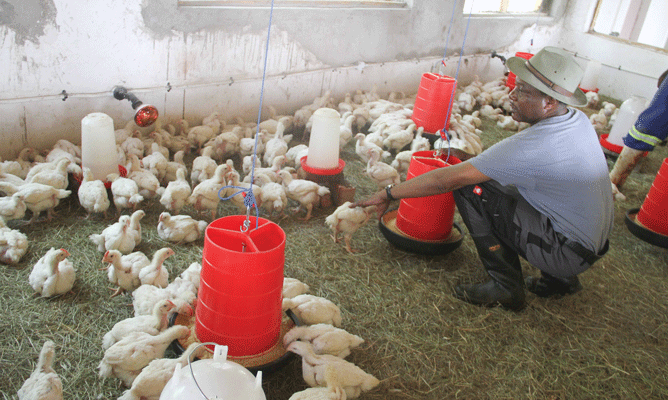Farmers urged to be alert for crops, livestock diseases
FARMERS have been urged to practice proper control and management measures so as to protect their crops and livestock during the summer season.
According to the Meteorological Services Department this summer season, the country is expected to receive normal to above normal rainfall for the 2020/21 rain season. Matabeleland North Department of Agricultural Technical and Extension Services (Agritex) provincial principal agronomist Mr Davison Masendeke said it was important for farmers to be on alert for pests that might attack their crops.
“When you have lots of rains there are various diseases that affect the crops. The most menacing pest at the moment is fall armyworm and it mostly attacks your cereals such as maize. It chooses the leaves, then the later generations also goes into the cob eating the grain inside. It can also attack the silks and tassels so it can be very devastating for maize farmers. We have seen that it attacks your maize at about two weeks of emergency so farmers have to be on alert for this pest.
“The pest also goes into the funnel/heart of the maize and then they feed from inside. So once they have gone inside it then becomes very difficult to control them because as it is eating, it is depositing the dirt on top of the maize. So the chemicals you would try to use sometimes can’t reach them easily. Hence, farmers have to start checking for this pest as early as two weeks,” said Mr Masendeke.
He added that once farmers notice further damage by the pest they should contact Agritex.
“You check first for the fall armyworm eggs which you will find probably in a cluster at the base of the leaves. Later on, you can find the same eggs at the base of the cobs. The eggs come in a mass and you can just probably destroy them with your hands. And then once you see the signs and symptoms of damage which is the chewing of the leaves then you start preparing for control or management practices, which is mainly your chemical control. Also contact your local extension Agritex officers for assistance and advice,” he said.
Mr Masendeke also said that they were also on the alert of locusts and they are to start trainings for their officers.
“We are also currently on alert in terms of locusts. They have been sighted in some neighbouring countries so we are on full alert. With the assistance of some NGOs we are currently trying to train our staff on the biology, ecology, behaviour and management of what we call migrant pests. They are called migrant because they move from one outbreak or invasion areas to new areas. These include the locusts which fall into two types of the African migratory locusts and the red locust, also to some extent the desert locust because we are next to the Kalahari Desert. Basically, in the next two to three weeks we will be training our staff,” said Mr Masendeke.
He said the training will also include the management of the African armyworm, fall armyworm and the red billed weaver bird. Mr Masendeke said farmers will also be trained to look out for the stem borer which attacks mainly your cereals maize and sorghum.
“It has the same behaviour like the fall armyworm but it’s less menacing. We also recommend that farmers use cultural practices like reducing sand into the funnel of the maize, the medium grained sand so that when the pests move into the funnel of the maize they are brushed, bruised or punctured by the sand particles. Those are the major pests that we are looking at in field crops.”
Agritex provincial livestock officer, Mr Admore Chikohwa also urged farmers to practice good hygiene for their livestock.
“Hygiene aspects should be taken care of because when it’s raining cattle hooves become soft making them vulnerable to any injury or foot rot. The same goes for goats and chickens. So farmers have to make sure that their kraals are not always muddy by practising the three kraal system,” said Mr Chikohwa.
Meanwhile, Matabeleland North Department of Veterinary Services provincial officer Dr Polex Moyo said most farmers risk losing their livestock if they do not take proper precaution of tick-borne diseases.
“At least 60 percent of the livestock deaths are caused by tick-borne diseases. It is very important for farmers to take their livestock for dipping. We had a launch of the new improved way of dipping livestock. Farmers through the livestock development agroforestry should organise themselves and buy enough dip for their livestock. They should not always be dependent on Government to provide them with it, they are the ones who own these cattle so they should be on the forefront to take care of them because it is a very crucial period from now till April next year,” said Dr Moyo.
He added that farmers should also be on alert of worms that can attack livestock.
“Other diseases caused by the rains result in inner worms that attack livestock. But farmers should not be in a hurry to doze now because there hasn’t been much rains, maybe after a month when we would have received serious rains, close to mid-December they can then start to doze their cattle for worms. Lumpy skin disease also affects cattle and it should be treated before it starts to rain not when the animal has been attacked. For goats it’s the same like cattle, its ticks and worms that affect them. Also pulpy kidney which they have to be aware of and be able to protect their goats,” he said.-sundaynews








